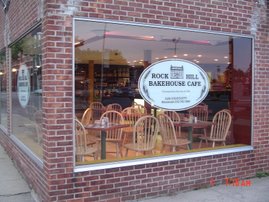It used to be that if you had a problem with the government or criminals or business interests (or most frequently, all three working together), you could take your case to the highest court in the land and ... justice would probably be served (sometimes) (maybe) (sort of). That proud record of (almost) (kind of) serving a higher public calling totally collapsed yesterday as the Supreme Court removed yet another of our (sort of)precious civil rights.You may already be aware of this story. It regards the use of eminent domain to steal property from private landowners. If so, please disregard the Salon story I've posted below. We have a similar problem, locally. There is a Burger King "restaurant" right smack in the center of downtown Glens Falls that public officials, criminals and business interests would just love to see forced out so that they can develop a convention center and hotel in its place.Now, let me stress that I am no friend of Burger King. It is a terrible worthless blight on our landscape and an awful thing to have at the center of our downtown. Nonetheless, to paraphrase Nathan Hale, I would defend their right to own that land that they bought and pay taxes on even though I hate their business, do not patronize them and feel that they are major contributors in the dumbing-down of America's palate. The "highest" court in our land has now set us all on an unbelievably frightening path regarding eminent domain with this case they have just decided in Connecticut. Now, apparently, we are going to allow any land-grabbing scum or air-salesman to take over any property they see fit for their own profit! The original language mandating "public use" was already questionable, at best. If the Supreme Court was, in fact, "high", I think it likely they may have decided this case differently (certainly in a less fascist manner). Their newest decision means that from here on in, private interests can steal any property they want simply by taking over local government. Now, wait a minute .... aren't pretty much all small town governments already under the thumb of real estate developers? What do you think happens next? Do you own property? This is absolute proof that fascism is afoot in our nation, noble experiment aside. Please don't be the last person to wake to it.Peace,MattSupreme Court rules cities may seize homesby Hope YenJune 23, 2005 Washington -- A divided Supreme Court ruled Thursday that local governments may seize people's homes and businesses against their will for private development in a decision anxiously awaited in communities where economic growth often is at war with individual property rights.The 5-4 ruling -- assailed by dissenting Justice Sandra Day O'Connor as handing "disproportionate influence and power" to the well-heeled in America -- was a defeat for Connecticut residents whose homes are slated for destruction to make room for an office complex. They had argued that cities have no right to take their land except for projects with a clear public use, such as roads or schools, or to revitalize blighted areas.As a result, cities now have wide power to bulldoze residences for projects such as shopping malls and hotel complexes in order to generate tax revenue.The case was one of six resolved by justices on Thursday. Among those still pending for the court, which next meets on Monday, is one testing the constitutionality of displaying the Ten Commandments on government property.Writing for the court's majority in Thursday's ruling, Justice John Paul Stevens said local officials, not federal judges, know best in deciding whether a development project will benefit the community. States are within their rights to pass additional laws restricting condemnations if residents are overly burdened, he said."The city has carefully formulated an economic development plan that it believes will provide appreciable benefits to the community, including -- but by no means limited to -- new jobs and increased tax revenue," Stevens wrote.Stevens was joined in his opinion by other members of the court's liberal wing -- David H. Souter, Ruth Bader Ginsburg and Stephen G. Breyer. The bloc typically has favored greater deference to cities, which historically have used the takings power for urban renewal projects that benefit the lower and middle class.They were joined by Reagan appointee Justice Anthony Kennedy in rejecting the conservative principle of individual property rights. Critics had feared that would allow a small group of homeowners to stymie rebuilding efforts that benefit the city through added jobs and more tax revenue for social programs."It is not for the courts to oversee the choice of the boundary line nor to sit in review on the size of a particular project area," Stevens wrote.O'Connor argued that cities should not have unlimited authority to uproot families, even if they are provided compensation, simply to accommodate wealthy developers."Any property may now be taken for the benefit of another private party, but the fallout from this decision will not be random," she wrote. "The beneficiaries are likely to be those citizens with disproportionate influence and power in the political process, including large corporations and development firms."Connecticut residents involved in the lawsuit expressed dismay and pledged to keep fighting."It's a little shocking to believe you can lose your home in this country," said resident Bill Von Winkle, who said he would refuse to leave his home, even if bulldozers showed up. "I won't be going anywhere. Not my house. This is definitely not the last word."Scott Bullock, an attorney for the Institute for Justice representing the families, added: "A narrow majority of the court simply got the law wrong today and our Constitution and country will suffer as a result."At issue was the scope of the Fifth Amendment, which allows governments to take private property through eminent domain if the land is for "public use."Susette Kelo and several other homeowners in a working-class neighborhood in New London, Conn., filed suit after city officials announced plans to raze their homes for a riverfront hotel, health club and offices.New London officials countered that the private development plans served a public purpose of boosting economic growth that outweighed the homeowners' property rights, even if the area wasn't blighted.Connecticut state Rep. Ernest Hewett, D-New London, a former mayor and city council member who voted in favor of eminent domain, said the decision "means a lot for New London's future."The lower courts had been divided on the issue, with many allowing a taking only if it eliminates blight.Nationwide, more than 10,000 properties were threatened or condemned in recent years, according to the Institute for Justice, a Washington public interest law firm representing the New London homeowners.New London, a town of less than 26,000, once was a center of the whaling industry and later became a manufacturing hub. More recently the city has suffered the kind of economic woes afflicting urban areas across the country, with losses of residents and jobs.City officials envision a commercial development that would attract tourists to the Thames riverfront, complementing an adjoining Pfizer Corp. research center and a proposed Coast Guard museum.New London was backed in its appeal by the National League of Cities, which argued that a city's eminent domain power was critical to spurring urban renewal with development projects such Baltimore's Inner Harbor and Kansas City's Kansas Speedway.Under the ruling, residents still will be entitled to "just compensation" for their homes as provided under the Fifth Amendment. However, Kelo and the other homeowners had refused to move at any price, calling it an unjustified taking of their property.
The case is Kelo et al v. City of New London, 04-108.
Friday, June 24, 2005
Subscribe to:
Post Comments (Atom)



No comments:
Post a Comment